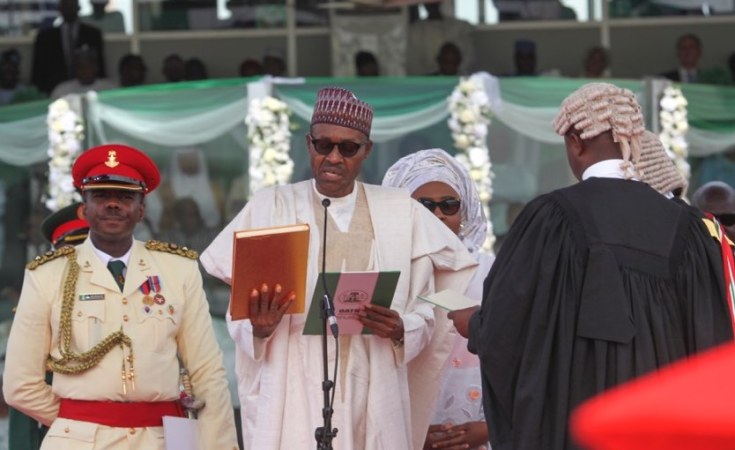On Friday May 29th, 2015, a new Government was inaugurated in Nigeria. The activities leading up to the General elections climaxed on the 28th of March when citizens went out to cast their votes. It became a two-day affair - a drawn out event that tested the tenacity of its citizens; people who remained resolute in ensuring their votes counted.
There are several reasons these 2015 elections will remain memorable for Nigerians. Firstly, it involved unseating an incumbent government; secondly, it dislodged Nigeria's lead political party (which was the first time this has happened since its return to civil rule in 1999); and thirdly the incumbent President Good-luck Jonathan conceded defeat and congratulated his opponent even before the official results were announced by the Independent National Electoral Commission. On top of all this, Nigeria's electoral process was carried out with minimal violence.
Just why Nigeria's 2015 elections were so successful will no doubt be the subject of much discussion and analysis for years to come.
Personally, I see the level of awareness and involvement by Nigerians and the role that social media played in directing political discourse and shaping conversation (by 'online activists') as key determinants for why these elections transpired so well. Certainly there are many factors that contributed to the success of the elections, but it was the genuine passion and interest that citizens showed in the policy conversation around the election that truly stands out as both remarkable and commendable.
Elections on their own do not guarantee good governance. We often forget this truth. But democracy without good governance is effectively meaningless. The role of citizens as the ultimate sovereigns does not end with the electoral process. It actually extends to their capacity to be part of the governance process over the long-term. Holding government accountable to its elections promises gives meaning to the ballot and reinforces the primacy of citizens. The momentum generated by the 2015 elections provides a unique opportunity to build on citizens' activism, exemplified in the ardent online conversations seeking to hold government accountable to their campaign promises.
A prime example of how this 'online activism' manifests is through the Buharimeter, a Center for Democracy and Development (CDD) project carried out with the support of the Open Society Initiative for West Africa (OSIWA). The Buharimeter is an online and mobile technology tool designed to track and measure campaign promises of the new government.
This tool is patterned after the Macky Meter in Senegal and functions as a platform that aggregates all the President-elect promises on a sector-by-sector basis.
At the core of this project is the desire to deepen democratic accountability and promote active citizens' participation in governance issues. The site has created a space for people to comment and contribute to discussions on each of the promises made by the incoming administration. The platform allows citizens to score the performance of government, by sector, through responding to a set of relevant questions that are pre-set on the platform. Additionally, government policy documents will also be uploaded. These policy documents will be tied to each of the promises, which allows citizens to assess and discuss the viability of the policy option adopted as compared to the realization of promises stated. There is also an "I-Witness page" to allow the uploading of pictures and videos of projects related to the promises made.
The project hopes to challenge citizen's fixation with the "supply side" of governance, which conversely places a lot less emphasis on the demand side- demanding accountability for government programs, reforms and public goods. It encourages citizens to keep a keen eye on what government has promised with a view to ensuring they perform and are responsive to the people they govern. The project also has a weekly radio program that starts on June 1st on Nigeriainfo FM Abuja (airing between 6pm and 7pm) and which will move the discussion offline. For maximum impact and reach, both online and offline engagements are essential. Progressive change would only happen when there is a balanced combination of both top-down and bottom-up pressures in the governance process.
It's not just the Buharimeter project that shows the extent of citizens' engagement in monitoring their new government's activities to ensure accountability. In the lead-up to the March 28th elections, a particularly prominent hashtag - known as #BabaNowThatYouAreThere - was created as a way for twitter enthusiasts to share their list of 'asks' to "Baba", their (expected) new leader.
People's imaginations began running wild with all sorts of wishes and requests - some unrealistic or simply in gist, such as Arsenal winning the Premier League, to some more serious and achievable, such as ensuring Nigeria became a fully-functioning democracy replete with power, employment, a stable economy and (above all) rid of corruption.
The hashtag brought to the fore what most people wanted to see in their new government. And even though many of these asks were outside the bounds of reason, they were often shared with good humor and optimism.
They also helped engage and foster stronger citizen engagement and awareness on a more general level.
One of the key outcomes of the 2015 elections is a renewed realization by ordinary Nigerians that they have some power to effect change. The Buharimeter is the perfect tool to ensure a level of consciousness in government actions is sustained and translates into qualitative engagement with the new administration. It sustains the drive that now that 'Baba' is there, 'Baba' must now go to work for the good of the people.
Watch the Buhari Campaign Promises infographics video here.
Catherine Kyenret Angai is OSIWA's Democracy and Accountability Program Coordinator. Follow Catherine on Twitter @AngaiCK


